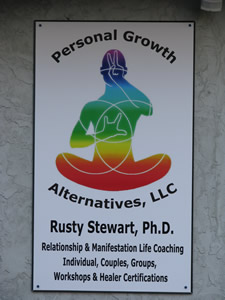
|

Articles Index
Newsletter Information
Newsletter Archives
Healing Products & Services For Purchase
Register For Workshops and Certifications
Directions
Holistic Integrative Breathing CD's and Online Store
Wisdom Of The Earth Medicinal Therapeutic Grade Essential Oils
DVD's Coming Soon!
Holistic Community Circle Links

|

|
Articles
Discipline: Balancing our 3rd Chakra and Letting Go of the Ego!
By Rusty Stewart, Ph.D.
Discipline is one of those words that the ego loves because it is so easy to beat ourselves up and revert to guilt, fear, and shame if we believe we are not disciplined according to past definitions. It could be being disciplined to meditate everyday, disciplined to eat healthy foods, or disciplined to walk our talk. Don't get me wrong discipline is important, but not at the expense of black and white thinking, obsessive compulsive behavior, or any such attachment to what we are disciplining ourselves to do or not to do. The paradox is that when we can let go of our attachment and connect with our higher selves or spirit, discipline becomes much easier and without the intense energy of condemnation of self. It can even be something we have fun with and look forward to. Let me explain and give some examples.
The third charka is where appropriate self-discipline manifests. However, it is also where shame, the third charkas demon, is housed. An excellent book to refer to when integrating Eastern and Western philosophy and psychology as it relates to the charkas is Eastern Body Western Mind by Anodea Judith, 1996. It is important to balance our third charka, as well as all our other charkas, through yoga, meditation, breathwork, or many other healing methods. Some of the characteristics of a balanced third charka are as follows: responsible and reliable, a balanced and effective will, good self-esteem and balanced ego strength, warmth in personality, confidence, spontaneity, playfulness, and a sense of humor, a sense of one's personal power, the ability to meet challenges, and appropriate self-discipline (Judith, 1996).
Once again it is important not to get wrapped up in black or white thinking. The ego will keep us stuck if we get into this all or nothing type of thinking. Having balanced ego strength is a process of healing our damaged ego so we can begin the process detaching and letting it go. Balancing our charkas is a process, not a destination. This holds true for discipline, and transcending our egos as well. The paradox is that when we begin to experience a routine discipline long enough, letting go just happens. Not because we expect it, but because we are finding inner peace through the mundane, yet satisfying and fulfilling act of discipline. We even begin to look forward to our discipline. And if we miss it, we do it again when the time is right without judgment because we have no attachment to it. This is the subtle difference between addiction and preference. With addiction or compulsion we have to have or do it because we are attached to it. With preference we enjoy it but do not have to have or do it. Energetically this distinction makes all the difference.
Shame, as briefly mentioned above deserves more attention here. If we are locked into limiting beliefs from our past about who we are, shame can be debilitating at times. For example, if we are frustrated by our seeming inability to discipline ourselves, we may be feeling feelings of I can't do it, or I'm just not good enough, or there is something wrong with me, I'm not like everyone else. These thoughts and feelings of shame were learned and passed down to us. Self-love, self-forgiveness, and compassion for one's self are the keys to healing shame, guilt, and fear. The deeper healing is of the mind, which is accessed through spirit. By letting go and turning control and outcome over to our higher power or spirit, the creative energy of the universe heals our minds on a higher level where only love is present. I am not talking of the ego mind here, but our higher self mind. One of the easiest ways of incorporating effortless discipline is to call your higher power into all aspects of your life and ask for help in seeing things differently, regardless of whether you ego labels them good or bad. Greater peace will show up as part of this process over time. Discipline is not about forcing ourselves to do something. If over time your discipline is drudgery, then look for something else that speaks deeply to you inner self. Discipline is the key to freedom and letting go of the ego. It's really a very simple process, but not necessarily easy. Once you've experienced compassionate egoless discipline, you'll truly know what is meant by beginners mind.
YL Discipline, May/June 2002.

|







